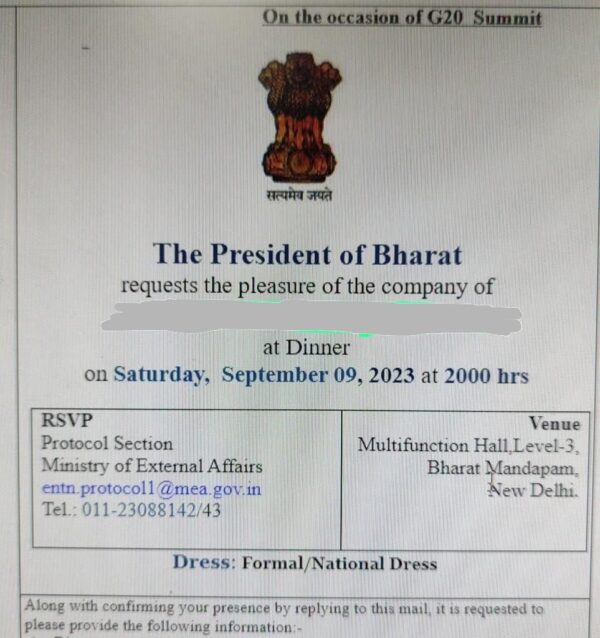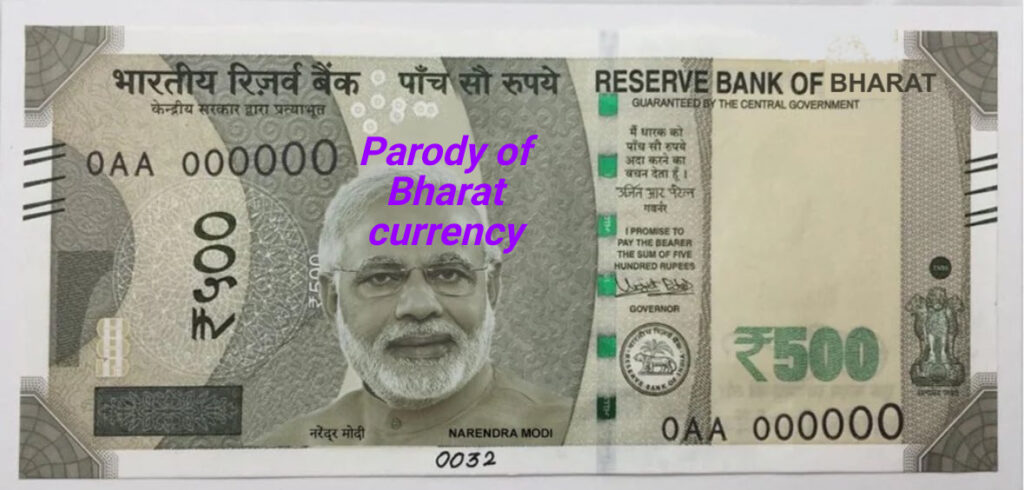From administrative and logistical points to legal and branding, the implications of changing a country’s name are numerous. This article will explore the cost of renaming a country.
Background
In invitations sent to World leaders on the occasion of G20 summit, the dinner invitation letter read, “The President of Bharat” raising speculations that India’s move to drop the name given to it by its colonial masters (British) is imminent.

Changing the name of the most populated country to Bharat has been a long time dream of India’s Prime Minister Narendra Modi.
And a 5-day meeting of Parliament is expected to kick start September 18, ending on September 22, where a possible ratification for a new name, Republic of Bharat, will be taken.
India isn’t the first to rename itself, it will not be the last either. Siam (now Thailand), Holland (now The Netherlands), and Portuguese Guinea (now Guinea Bissau) are among the countries that have changed their names in the past.
The process is technical and expensive, but it is seen by leaders as a thorough rebirth of a country that was once under colonial administration.
The layers of complexity in renaming a country
So, InfomediaNG takes a cursory look at the layers of complexity inherent in changing a country’s name.
- Administrative implications
- Economic implications
- Cultural implications
- Global events
- Financial implications
- Diplomatic implications
- Technological implications
- Legal and constitutional implications
- Global association
Administrative and Logistical Implications
Documentation Update:
All official documents such as passports, driving licenses, and identity cards, might need to be updated. This would be a huge project that will most likely gulp billions of local currency.
Signage and Infrastructure:
Public places, road signs, and government buildings would require name changes. Renaming a country means changing the logo of government agencies and repainting government buildings to reflect the new name.
Economic Implications
Rebranding Costs:
The country would incur costs for rebranding everything from government letterheads to national airline liveries.
Trade and Business:
In terms of global trade and commerce, existing trade agreements might need revisions, and businesses would have to update their records and branding accordingly to reflect the name change.

Diplomatic and Political Implications
Treaties and Agreements:
International treaties, agreements, and memberships (like the UN) would need to be updated.
Relations with Other Countries:
A name change would require the country to reband foreign missions and embassies around the world.
Cultural and Social Implications
National Identity:
A new name for a country can lead to a renewed sense of identity and unity among the population. For instance, if India succeeds in changing its name to the Republic of Bharat, it would mean the people of India would no longer be called Indian, something like “Bharatian” might suffice.
Educational Changes:
Textbooks and recommended educational materials would need revisions and re-editing to reflect the new name.
Technological Implications
Digital Updates:
Websites, digital platforms, and databases worldwide would need to be updated to reflect the new name.
Domain Names:
The country might need to apply for a new country-specific domain suffix.
For instance, the top level domain of a country that changed its name would also change
When you see just 2-letter to the right of the dot (.) instead of .com, that’s a country top-level known as country-code in domain name registry.
When you see .uk, that’s for the United Kingdom; .ng for Nigeria; .us for the United States, .pk for Pakistan; .ph for The Philippines, and .in for India.
If The Republic of Bharat comes to reality, the country might probably have .bh or .bt as its country-code domain name, who knows?
A country that changed its name would also have to change its country-code domain names.
Legal Implications
Constitutional Changes:
While we understand that change is constant, changing a country’s name isn’t what a president or prime minister can undertake unilaterally. It needs a legal framework.
Depending on the nation’s legal structure, changing the country’s name might require amendments to its Constitution and foundational laws.
Juridical Adjustments:
Laws, regulations, and international legal documents would require updates.
Financial Sector Implications
Currency redesign:
The nation’s currency might need to be reprinted or minted to reflect the new name.
While the buzz about The Republic of Bharat, proposed new name for India, took the social media on Tuesday, September 5, 2023, the Parody account for Narendra Modi circulated online about how the new currency for Bharat would probably look like.
Although still a proposal that will be determined by India’s Parliament between September 18-September 22, you can imagine the cost of minting a new currency for over a billion people.
Stock Exchange and Indices:
If the country has a significant global economic presence, global stock exchanges and indices might need adjustments.
Implications in Global Platforms
Sporting Events:
Sports teams would compete under the new name in international events, and historical records might need updating.
International Organizations:
Representation in organizations like the UN, WHO, IMF, etc., would have to be updated.
Conclusion
Changing a country’s name is not just a symbolic act but one that entails a cascade of changes across various sectors.
Changing a country’s name has cost and legal implications and requires careful consideration, planning, and execution to ensure a smooth transition on both the domestic and international fronts.

